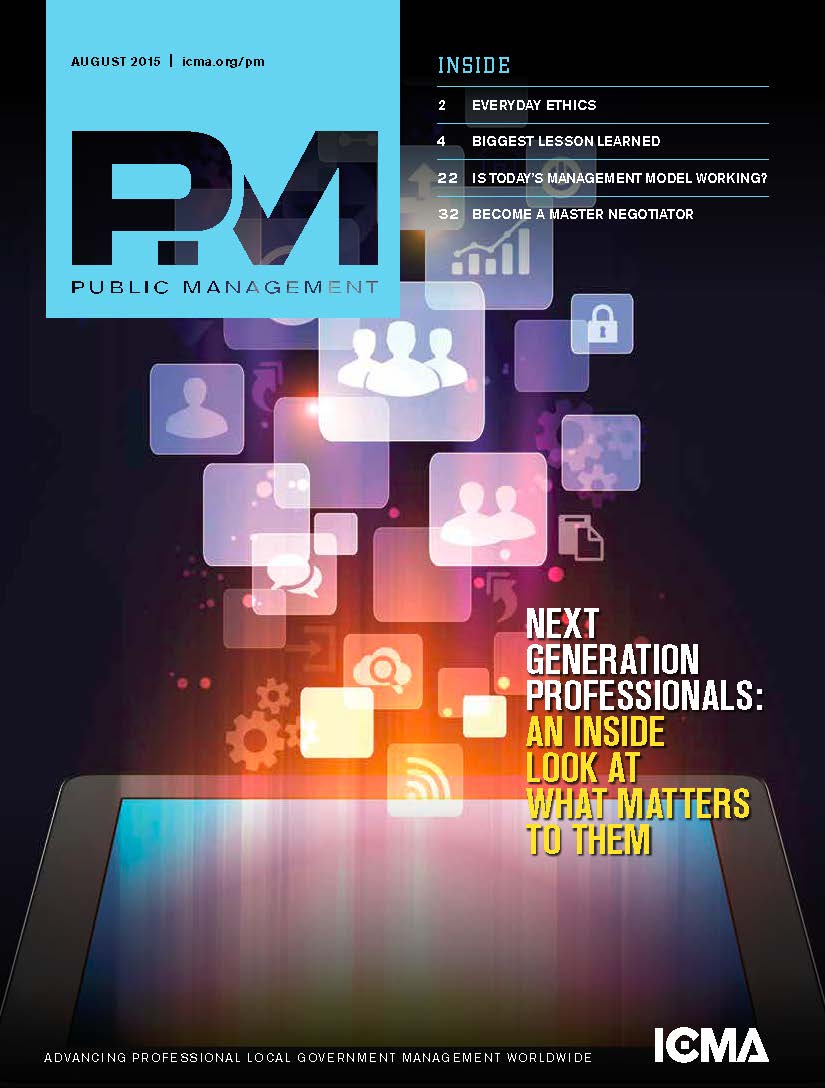
Peaking at nearly 78.8 million in 1999, the baby boom generation will be eclipsed for the first time in 2015 by millennials, who will grow to 75.3 million while the boomer cohort shrinks to 74.9 million, according to the Pew Research Center.
In “Next Generation Professionals: An Inside Look at What Matters to Them,” local government experts predict that this shift in workplace demographics will lead to significant changes among public sector workplaces. Leaders at all levels of government will need to adopt a new mindset in which their organizations become employers that compete for top talent along with other public, nonprofit, and private sector organizations.
The August 2015 Public Management (PM) magazine cover story, published by ICMA, is based on the results of an informal Local Government Workforce Study (LGWS) of younger local government staff members conducted in early 2015 and concluded that public sector recruitment and retention—and the ways in which governments proactively prepare their workplaces for the workforces of the future—will look altogether different than in the past.
Two-thirds of the LGWS study respondents indicated that “making an impact on community/public service” was the number one attraction to serving in local government. Government organizations will need to respond by proactively reaching out to potential candidates through social media; mobile recruiting; attention-grabbing ads and job descriptions; and customized, expedited interview and hiring processes.
Good management, culture, and the quality of coworkers were more important than compensation and benefits to more than twice the number of LGWS respondents. Local government managers will need to look for ways to not only attract but retain top performers, including:
- Flexible work programs. Job sharing, flexible hours, and telecommuting can make an organization more attractive to women, millennials, and older workers.
- Relationships. Employees supervised by highly engaged managers are 59 percent more likely to be engaged in their organizations than those supervised by disengaged managers, according to Gallup.
- Workplace culture. Nearly one-third of the LGWS respondents indicated that they want their organizations to focus more on employee input and communication. The most commonly reported demotivating factors reported by respondents are poor organizational management and oversight.
- Professional development and growth. Forty-five percent of LGSW respondents indicated that investment in employee development in the form of leadership and professional development and training, coupled with growth opportunities, topped the list of things organizations could do to help employees advance their careers.
- Experiential learning. More than one-third of the LGWS respondents indicated that “general experience with management and leadership” was the number one skill they needed to improve to further their careers.
The authors of “Next Generation Professionals” concluded that government managers must proactively prepare their workplaces for the future by
- Analyzing current demographics and projecting attrition among not only older workers but all age groups.
- Partnering with local learning institutions to make staff development opportunities available to employees and to develop a pipeline of future workers through internships and apprenticeship programs.
- Evaluating paid-time-off policies that can provide the foundation for flexible work arrangements and create an employee retention “carrot.”
- Providing cultural awareness training to appeal to the desire among young employees to cultivate a diverse workforce and to send a signal that the workplace is a platform for the discussion of such challenging issues as cultural communication styles, giving and receiving feedback, and reviewing and assessing employee performance.
Click here to download the entire August issue of Public Management (PM) magazine, including the cover story “Next Generation Professionals: An Inside Look at What Matters to Them.”
ICMA, the International City/County Management Association, advances professional local government worldwide. The organization’s mission is to create excellence in local governance by developing and fostering professional management to build sustainable communities that improve people’s lives. ICMA provides resources to 9,500 appointed city, town, and county leaders and other individuals and organizations throughout the world. The management decisions made by ICMA's members affect millions of individuals living in thousands of communities throughout the world, from small villages and towns to large metropolitan areas.
New, Reduced Membership Dues
A new, reduced dues rate is available for CAOs/ACAOs, along with additional discounts for those in smaller communities, has been implemented. Learn more and be sure to join or renew today!
